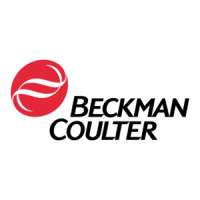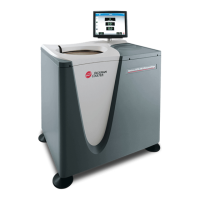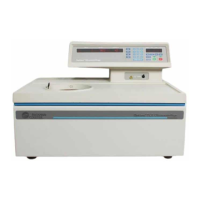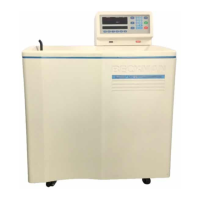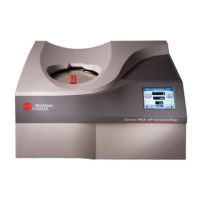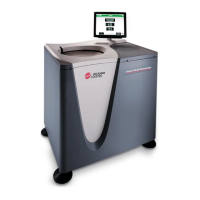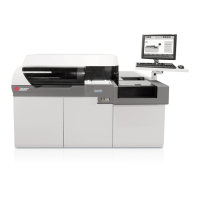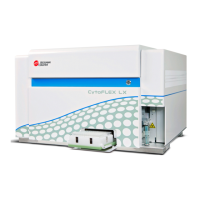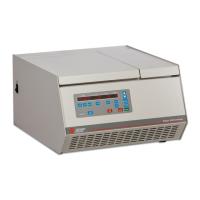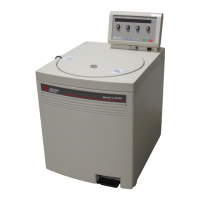Do you have a question about the Beckman Coulter Optima L Series and is the answer not in the manual?
Details ISO certification and regulatory compliance of the ultracentrifuges.
Outlines the purpose and content covered in the instruction manual.
Explains symbols and formatting used for important information and warnings.
Defines formatting for key names and display names for clarity.
Information on FCC compliance and potential radio interference issues.
Statement regarding compliance with Canadian radio noise emission limits.
Explanation of the WEEE directive symbol and proper disposal guidelines.
Technical details including control characteristics and operational features.
Provides weight, dimensions, and environmental requirements of the instrument.
Guidelines and cautions regarding instrument installation.
Details the instrument's electrical ratings, power range, and wiring.
Specifies required clearances and environmental conditions for operation.
Information on specialized installation kits for BSL-3 laboratories.
Control of electrical power via circuit breaker and emergency POWER OFF button.
Automatic low-power mode when idle, reactivated by any key press.
Selects normal or zonal operation using a key interlock switch.
Overview of the front panel layout with keys, displays, and indicators.
Details on parameter and activation keys for run control.
Digital displays show speed, time, temperature, and program status.
LEDs indicating the instrument's operational status during a run.
Red LEDs alerting to conditions needing attention or indicating errors.
Describes the chamber door construction and its solenoid interlock.
Details the aluminum rotor chamber and its internal components.
Functionality of the vacuum system, including activation and pressure indication.
Methods used for detecting rotor temperature (radiometer/thermistor).
Solid-state thermoelectric system for precise temperature regulation.
Safety feature to prevent rotor exceeding maximum speed limits.
Monitors and limits rotor energy to ensure safety.
Description of the frequency-controlled, air-cooled direct-drive induction motor.
Location and purpose of the serial and model number plate.
Turning the instrument on and its standby mode behavior.
How to use the key interlock for normal or zonal operation.
Preparing for a standard centrifugation run.
Using the keypad for numerical entries and special functions.
Detailed usage of keys for setting speed, time, temperature, etc.
Setting and understanding the w2t parameter for run termination.
Using the HOLD mode for runs of unspecified or very long duration.
How to set and adjust the desired operating temperature.
Selecting different profiles for rotor acceleration and deceleration.
Storing, recalling, and modifying run programs.
Using keys like VACUUM, START, and STOP to control the centrifuge.
Setting up runs to begin automatically at a later time.
Modifying parameters during a delayed start run without saving changes.
Step-by-step guide for performing a standard centrifugation.
How to easily repeat a previous run configuration.
Executing a run using stored program settings.
Initiating runs with a delayed start time.
Procedures for conducting runs using zonal rotors, including safety warnings.
How the rotor accelerates after the chamber door is closed.
How the rotor decelerates at the end of a run or when stopped.
Steps for safely unloading the rotor after a run.
Key reminders for optimal performance and maintenance.
Handling power interruptions and resuming operation.
Steps to access the rotor chamber after a prolonged power failure.
Explanation of error codes, their causes, and user actions.
Recommended methods for cleaning instrument surfaces.
Procedures for decontaminating after exposure to radioactive or pathogenic substances.
Methods for sterilizing and disinfecting the instrument.
Guidelines for storing and transporting the instrument.
List of common parts and supplies for ordering.
Policy for returning defective products for repair or replacement.
Warranty details specific to the drive unit replacement.
Requirements for warranty coverage, particularly for the drive unit.
Legal disclaimer regarding warranties and liabilities.
| Brand | Beckman Coulter |
|---|---|
| Model | Optima L Series |
| Category | Laboratory Equipment |
| Language | English |
